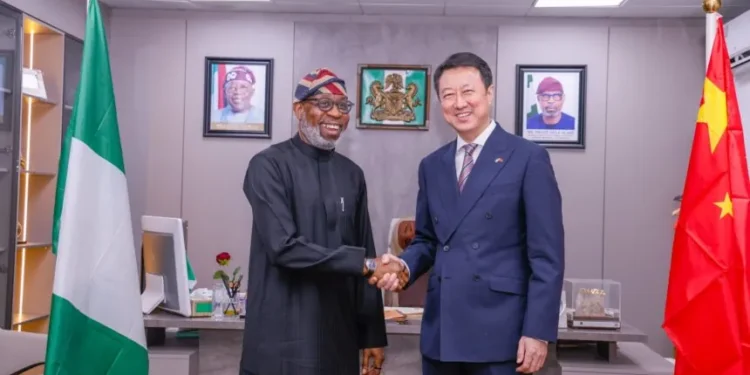The Chinese government is planning to establish electric vehicle (EV) factories and other manufacturing ventures in Nigeria as part of efforts to deepen economic ties between both countries.
This was revealed in a statement issued on Sunday by Segun Tomori, Special Assistant on Media to the Minister of Solid Minerals Development, Dr. Dele Alake.
According to Tomori, the plans were discussed during a recent bilateral meeting between Minister Alake and the Chinese Ambassador to Nigeria, Yu Dunhai.
The statement quoted the Chinese envoy as emphasizing stronger collaboration between China and Nigeria, particularly in the solid minerals sector. He reportedly noted that the proposed establishment of EV factories would be a significant step toward unlocking Nigeria’s mineral potential and fostering local value addition.
Tomori also stated that Ambassador Dunhai expressed China’s support for Africa’s industrialisation—a key pillar of Chinese President Xi Jinping’s foreign policy agenda. He cited recent high-level engagements between President Bola Tinubu and President Xi Jinping during Tinubu’s state visit to China, which aimed at advancing bilateral relations to a comprehensive strategic partnership.
“Chinese companies are already significantly involved in Nigeria’s mining sector, from exploration to processing,” the ambassador was quoted as saying. “We aim to deepen this collaboration, especially in line with President Tinubu’s eight-point agenda, which includes economic diversification through the development of solid minerals.”
China backs Nigeria’s regulatory push in mining sector
The statement further noted that in response to concerns raised by Dr. Alake over reports of illegal mining activities by some Chinese companies, Ambassador Dunhai affirmed his government’s commitment to regulatory compliance.
Tomori said the envoy reiterated that the Chinese government maintains a strict zero-tolerance policy for illegality and encourages all its nationals and companies to operate within Nigeria’s legal and regulatory framework. He added that Chinese firms have also been directed to implement robust Corporate Social Responsibility (CSR) initiatives and adhere strictly to environmental and safety standards.
The ambassador, as quoted in the statement, assured that the Chinese embassy in Nigeria would continue to support efforts aimed at prosecuting non-compliant entities and strengthening oversight mechanisms in the sector.
In his own remarks, Minister Alake reiterated the Nigerian government’s drive toward sustainable development through electric mobility, pointing to the country’s vast lithium deposits as an incentive for local manufacturing of EVs and batteries.
“We have taken decisive steps against illegal operators, including some Chinese nationals. While these are isolated incidents, they tarnish the image of the many compliant Chinese firms,” Alake was quoted as saying. “We need your continued cooperation to ensure that culprits are held accountable.”
He emphasized that Nigeria remains open to genuine investors and is committed to ensuring that mining operations in the country focus on local value addition.
“With our abundance of lithium, we want to see investments in local manufacturing of electric vehicles and batteries. This is crucial for driving industrial growth and achieving sustainable development,” he added.
What you should know
China remains Nigeria’s largest source of imports. According to the National Bureau of Statistics (NBS) 2024 trade report, imports from China rose sharply to N14.14 trillion in 2024, up from N6.6 trillion in 2023, reinforcing China’s position as Nigeria’s top import partner.
- Meanwhile, Nigeria’s electric vehicle (EV) landscape has been witnessing growing momentum on multiple fronts. For instance, C&I Leasing Plc recently announced the expansion of its electric vehicle operations at its Ghanaian subsidiary. The move followed an impressive oversubscription of its Series 5 Commercial Paper issuance, demonstrating investor confidence in its sustainable transportation strategy. Read more here.
- Earlier in the year, Nairametrics reported a wide range of electric vehicles already being sold in Nigeria, with prices ranging from N12 million to as high as N150 million. The report detailed some of the most popular models and the growing interest among upper-middle-class Nigerians and institutional buyers in transitioning to electric mobility. Full story here
- In a more significant policy move, the Federal Government in March 2025 approved a N151.9 billion funding package for the deployment of electric buses, tricycles, and charging infrastructure across the North-East region. This initiative is aimed at promoting cleaner energy solutions, reducing emissions, and deepening EV penetration in underserved regions. Details here.














